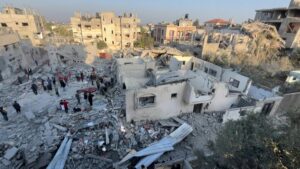US probing leak of documents about Israel’s plans to attack Iran
One of the documents, reportedly compiled by the Defense Department’s National Geospatial-Intelligence Agency, indicates that Israel’s plans involve relocating munitions.
“The Israeli Air Force continued air-launched ballistic missile (ALBM) handling, cover UAV operations, and conducted a second large-force employment (LFE) exercise from 15 through October 2024, according to imagery analysis,” says the document.
It notes that since Oct. 8, the Israeli Air Force has handled at least 16 Golden Horizon ALBMs and more than 40 IS02 (Rocks) ALBMs. The document adds that ALBM handling continued at Hatzerim Airfield as of Oct. 16.
Another document says it is sourced to the National Security Agency and outlines Israeli air force exercises involving air-to-surface missiles, also believed to be in preparation for a strike on Iran.
– ‘Deeply concerning’ –
The US is investigating the leak of the highly classified documents, according to CNN, which cited three individuals familiar with the matter. One source confirmed the authenticity of the documents. A US official described the leak as “deeply concerning,” CNN reported.
It also reported that a US official said an investigation is in place to determine who had access to the alleged Pentagon documents. Such a leak would automatically prompt an inquiry involving the FBI, alongside the Pentagon and US intelligence agencies, said CNN.
The leak could be an attempt to disrupt the Israeli operation, according to the Axios news website.
US President Joe Biden said Friday that he knows how and when Israel will carry out its attack on Iran as Tehran warned it would respond “decisively.”
Asked by reporters if he has a “good understanding” of what Israel’s response to Iran‘s Oct. 1 ballistic missile attack would entail, and when it would occur, Biden said succinctly: “Yes and yes.”
Biden has previously asked Israel not to attack Iran‘s oil or nuclear sites.
Iran said it carried out the ballistic attack in retaliation for the assassinations of Hamas’ former political leader in Tehran in July and the killing of Hezbollah Secretary-General Hassan Nasrallah in Beirut last month.
Nearly 200 missiles were fired in the salvo, which struck several locations in Israel, including a military facility, but resulted in no fatalities.
The exchanges of fire between Tel Aviv and Tehran escalated this year after Israel bombed Iran‘s Embassy in Syria on April 1, killing senior military officials. Iran responded to that attack two weeks later by launching hundreds of drones and ballistic missiles at Israel.
Nearly all were intercepted by Israel, the US and its allies.










